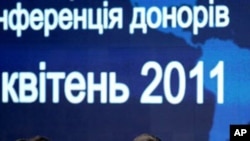Not long after midnight on Saturday, April 26th, 1986, the fourth reactor of the Chornobyl Nuclear Power Plant in northern Ukraine exploded, spewing radioactive steam into the atmosphere. It was the worst nuclear power plant accident in history. Today, we pause to mark the 25th anniversary of this tragic event.
As clouds of radioactive material spread over large portions of the Western Soviet Union and Europe, over half a million workers at the stricken plant struggled around the clock to contain the nuclear fallout and mitigate a humanitarian crisis. More than 350,000 people had to be evacuated from contaminated areas of Ukraine, Belarus and Russia. Some 30 people died within weeks of the accident as a result of radiation poisoning. Many others experienced birth defects, life-long health problems and shortened life expectancies.
The international community continues to work hard to restore the Chornobyl site to an environmentally safe condition. On April 19, Ukraine hosted the "Kyiv Summit on the Safe and Innovative Use of Nuclear Energy" as well as an international donors' conference that raised roughly $790 million towards the construction of a new safe confinement over the damaged reactor and a storage facility for spent fuel rods necessary for decommissioning the plant.
As the largest bilateral donor, the United States pledged $123 million towards the completion of these projects, originally initiated by the G7 in the 1990s in exchange for Ukraine shutting down the remaining three operational reactors on site and taking the associated loss in revenue.
In a press release, U.S. Secretary of State Hillary Clinton proclaimed: "On behalf of President Obama and the people of the United States I reaffirm the commitment of the United States to stand with Ukraine and the 44 other nations participating in the Kyiv Summit as we mark the 25th anniversary of the Chornobyl nuclear disaster and complete Chornobyl's transition to an environmentally-safe site."
She added that the completion of the two nuclear safety projects at Chornobyl "will help finally close this difficult chapter for the people of Ukraine and the region."
Since the late 1990s, and prior to our latest pledge, the U.S. had given some $240 million to restore Chornobyl to a safe condition. The U.S. has also invested millions of dollars in nuclear safety, health, and non-proliferation programs in Ukraine. This partnership has helped Ukraine to become a leader, both in nuclear safety and in non-proliferation.
Chornobyl 25 Years Post Disaster

Today, we pause to mark the 25th anniversary of this tragic event.



















